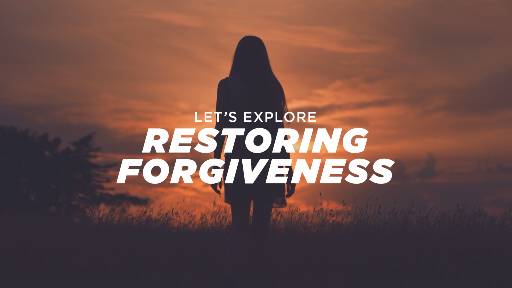-
Do We Really Want God To Forgive Our Debts As We Forgive Our Debtors?
Contributed by Alan Perkins on May 6, 2018 (message contributor)
Summary: If we want to be forgiven, we must forgive the sins of others against us.
This morning, we will be hiking through some challenging spiritual terrain, but I promise that the destination will be worth the journey. I’d like to talk about one thing, one critical thing, that if done or not done can make or break a marriage, make or break a family, make or break a friendship, or even a church. It is fundamental to our identity as Christians, and yet often taken for granted or even disregarded, as if it were only a minor detail in the Christian life. I’m going to suggest to you that neglect of this spiritual practice will have serious negative consequences for us and for our relationships, while giving attention to it, on the other hand, will have great benefits for each of us personally, and for those with whom we are in relationships of various kinds. In fact, I would go so far as to say that regular practice of this discipline is one of the main keys to building, and maintaining, strong relationships. And that powerful spiritual discipline is forgiveness.
I would like us to begin by considering a passage in which Jesus teaches his followers to pray. Because this short model prayer highlights those things which we need to ask God for every day. Those things which are so fundamental, so critical to walking with God that we need to ask for them continually throughout our lives: over, and over, and over again.
I’m talking of course, about the Lord’s Prayer. In the church I grew up in, we recited this prayer every Sunday, and as I was preparing this morning’s sermon it struck me that we haven’t done this at Providence in a long time. And frankly, I miss it. So in a moment, I’m going to invite everyone to stand and recite the Lord’s Prayer together. Now, if this prayer doesn’t reflect what is in your heart, or if for any other reason you just prefer not to participate, that’s fine. You are welcome to stand silently, or just remain seated.
One more thing: many of you probably have a version of this prayer memorized, but I’m going to ask that you please read from the slide, so that we don’t have any unfortunate “trespasses” vs. “debts” incidents. You know what I mean. It’s very embarrassing when
you are in a church that says “forgive us our debts” and you’re belting out “forgive us our trespass— oops”. Right? OK, let’s stand.
Matthew 6:9-13
9 “This, then, is how you should pray:
‘Our Father in heaven,
hallowed be your name,
10 your kingdom come,
your will be done,
on earth as it is in heaven.
11 Give us today our daily bread.
12 And forgive us our debts,
as we also have forgiven our debtors.
13 And lead us not into temptation,
but deliver us from the evil one.’
Thank you. Please be seated. Now, let me ask you, did you mean what you just prayed? It’s not a trick question, and I don’t mean to be offensive, but did you mean what you prayed? The reason I ask is because the topic of this morning’s sermon is found in the second-to-last sentence in that prayer. “And forgive us our debts, as we also have forgiven our debtors.” Think about what you are asking when you pray that portion of the Lord’s prayer. You are saying, “God, please forgive my sins against you in the same way that I forgive the sins of others against me”. So here’s my question: Do you really mean that? Do you really want God to forgive you in the same manner that you forgive others?
To put it another way, do you really want God to forgive your sins:
• Reluctantly? or Slowly? or Grudgingly? or maybe, Never?
• Do you really want God to forgive your sins with strings attached, to “forgive” you but still keep reminding you, over and over, year after year, what you did wrong?
• Do you want God to forgive you, but at the same time spread the word so that everyone else knows how badly you messed up?
• Do you want God to forgive you, but to also decide that he doesn’t want anything more to do with you?
• Do you want God to forgive you, but keep you at arm’s length, instead of welcoming you back into his fellowship?
• Do you want God to “forgive but not forget”? Is that what you want?
No, if we were honest, many of us, and perhaps most of us at times, would have to admit that we hope God doesn’t forgive us the way we forgive others. No, we would prefer that he not “forgive us our debts, as we also have forgiven our debtors.” Because our forgiveness, when it comes at all, is often of pretty poor quality.

 Sermon Central
Sermon Central



